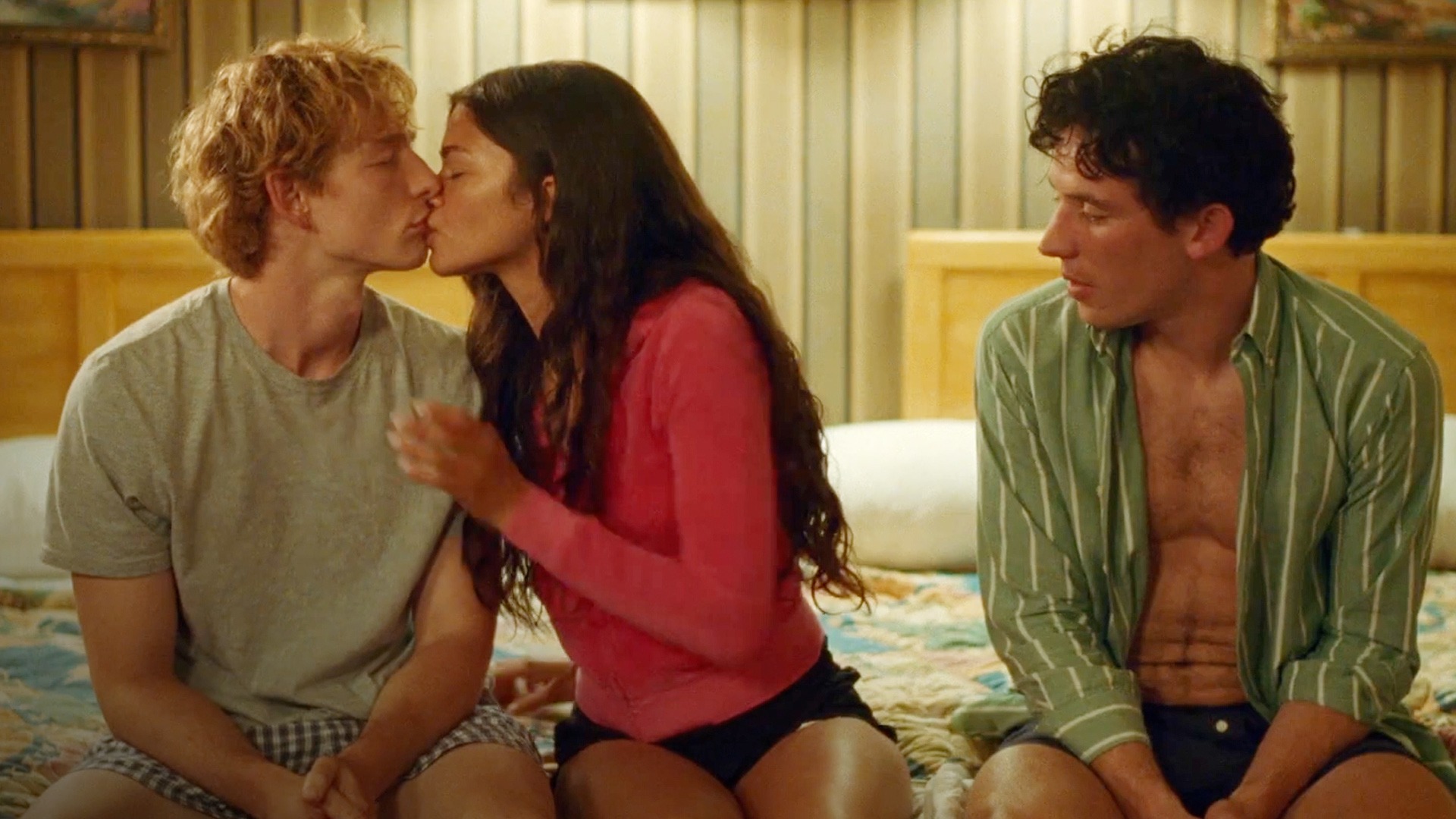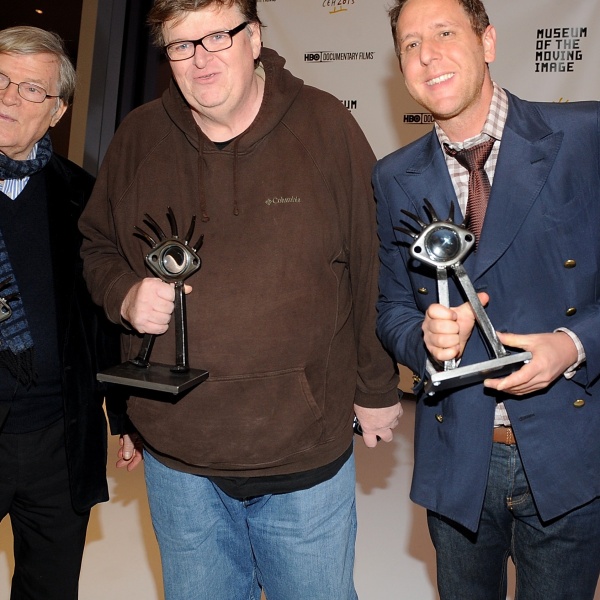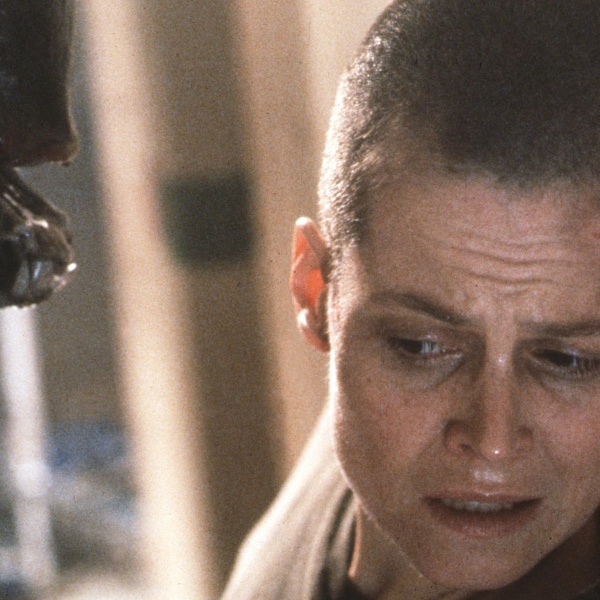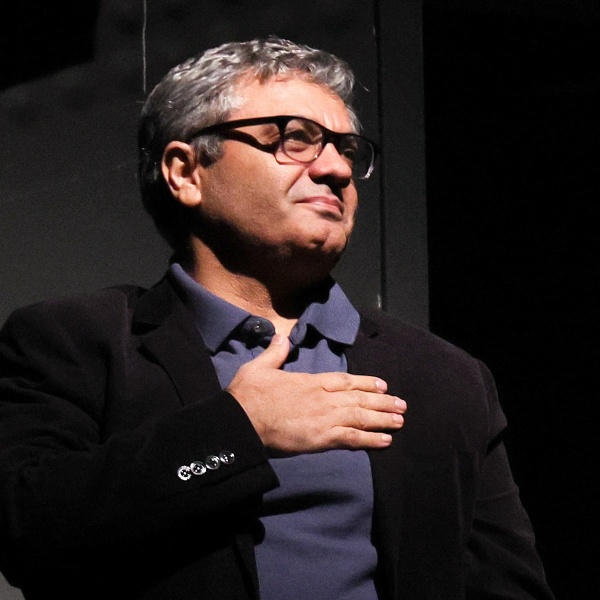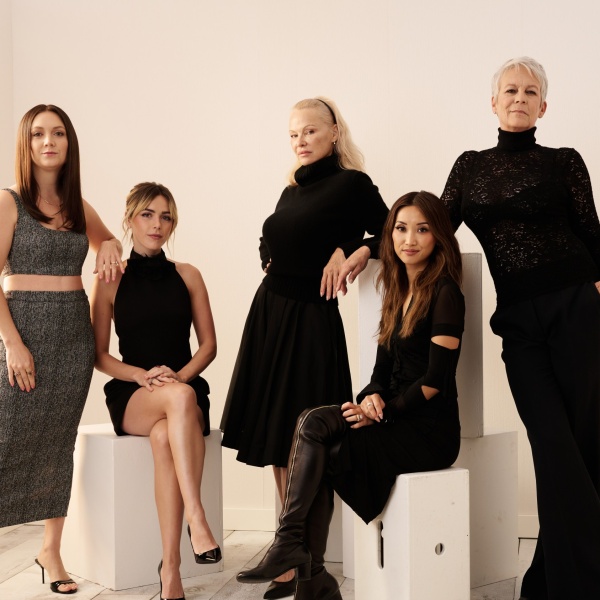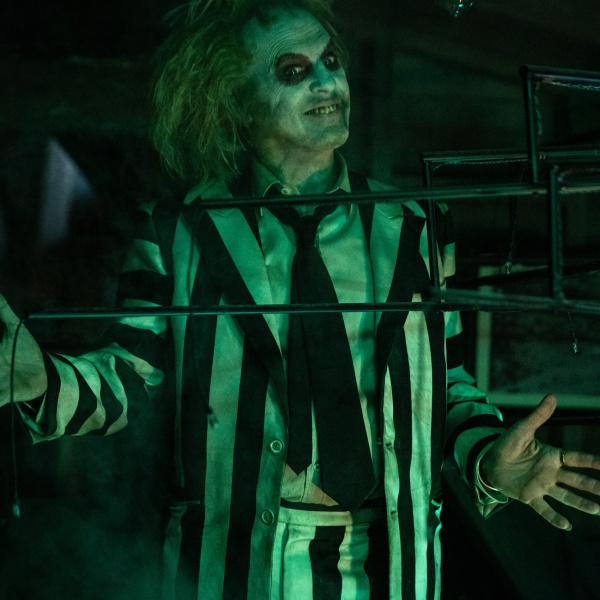
If, as Blanche Dubois once said, “The opposite of death is desire,” then Luca Guadagnino will live forever, and his latest film — a transcendently sweaty tennis love triangle so turned on by the heat of competition that its sex scenes feel like foreplay and its rallies feel like porn — is possibly the most unbridled portrait of resurrection since “The Passion of the Christ.”
It’s definitely the horniest story ever set within the purgatorial concrete nothing of New Rochelle, NY, which is where this movie’s three main characters all happen to cross paths during the final match of a dingy U.S. Open qualifier that’s being sponsored by a local tire store. They’ve been fucking each other on and off the court for more than a decade by the time “Challengers” unleashes its first serve, and yet, despite winning on every level of their chosen sport, these long-limbed athletes have lost their lust for life at some point along the way. At this point, their lust for each other might be the only force on Earth powerful enough to get their heads back in the game.
That might sound like the set-up for a relatively straightforward — if refreshingly bi-curious — romantic comedy, but “Challengers” is a far cry from “Wimbledon,” and Guadagnino couldn’t give less of a shit about who comes out on top at the end. On the contrary, the “Call Me by Your Name” director was likely turned on by the sensual backspin of Justin Kuritzkes’ script, which subverts the typical stakes of each match in order to focus on the animating thrill of wanting something with every flooded sweat gland on your body.
Here is a glistening, red-blooded, semi-American sports film where nobody wants to win at love because victory itself runs a distant second to the psychosexual ecstasy of having something worthwhile to play for, a reward that ultimately proves even more valuable than a USTA championship or Zendaya’s phone number. If orgasms are little deaths, then it’s fitting that nobody in “Challengers” ever has one on screen. These competitors only feel alive when they’re bound together by the mutual intimacy of being edged to the break points of their desire, and Guadagnino’s deliriously enjoyable movie doesn’t let any of its characters get off until even the most sophisticated Hawk-Eye line-calling technology on Earth would be unable to pinpoint the exact spot where tennis ends and sex begins.
Not that Tashi Duncan has ever bothered to look for it. The closest thing this movie’s love triangle has to a right angle, Tashi wasn’t always “just” the wife, coach, and branding partner of top-ranked superstar Art Donaldson (“West Side Story” breakout Mike Faist, whose soft and classic Broadway charm befits his character’s old school name), she used to be a Coco Gauff-level phenom in her own right before a horrific knee injury forced her to retire.
In fact, Art and his chaotic neutral best friend/doubles partner Patrick Zweig — played by Josh O’Connor, who puts a slutty new spin on the humble wayward dirtbag schtick he first perfected in “La Chimera” — first encounter Tashi on the court, where their tongues both roll out of their heads at the sight of this perfect creature whose killer instinct seems that much deadlier in light of her innocence off the court.
Later that night, the pair sidle up to at a Gatsby-like party that Adidas is hosting in her honor, and after Patrick calls her “the most beautiful woman he’s ever seen,” he insists that he’d “let her fuck me with a racket.” That arouses our attention because we already know who winds up marrying her (Patrick’s omnivorous sexuality is more of a character detail than a plot point, but it eventually sets up a hilarious sequence where he’s so desperate for a place to crash that he starts using Tinder like it’s Airbnb, swiping right on all of his potential matches in the hopes that one of them might put him up for the night).
This is back in the summer of 2006, the earliest point in the timeline of a movie that’s structured like a temporal pincer movement, Kuritzkes’ script constantly flipping between past and present like two players on the different sides of a tournament draw who are destined to meet in the finals. This is before Art and Patrick learn what it means to want something more than your opponent; before the duo once embarrassingly known as “Fire and Ice” are rebranded as “Tashi’s little white boys.”
Fresh off winning the junior doubles championships at the U.S. Open (a victory they celebrate by gobbling down a pair of hot dogs in a scene so hyper-charged with homoeroticism that it might seem like camp if not for the sincerity of Guadagnino’s staging), Patrick agrees to let Art win the singles match they’re scheduled to play against each other in the finals the next day. It’s what any rich dilettante with a weird serve would do for their scrappy, earnest, striver of a best friend who can’t afford to double fault.

Alas, that sacred bro code is shattered faster than one of John McEnroe’s tennis rackets when Tashi short-circuits a furtive motel three-way by announcing that she’ll only date the guy who triumphs on the court the next day, an idea that volleys across her face with a smirk as she coerces Art and Patrick to start kissing each other. Tashi knows they’ve always wanted to, and nothing turns her on like watching desire sublimate into action. Guadagnino holds the camera on Zendaya’s face in a long take that slowly frames the boys out of sight, an electrifying choice that cements her character as the surrogate audience of a ridiculously hot — but surprisingly chaste — movie in which sex is always, always in the service of sport. Needless to say, Art and Patrick will be competing over Tashi for the rest of their careers.
Which isn’t to suggest that she’s just a prize to be won — the tallest and most stunning trophy in a sport that tends to award its champions silver chalices and shiny plates. No, Tashi is simply a person who knows what she wants, and what she wants is someone who’s capable of returning her serve. That’s why she begrudgingly appreciates the prissy racist girl she’s always playing in the finals, who matches her stroke for stroke (“It’s like we were in love,” Tashi coos after one of their showdowns, “or like we didn’t exist”), and why, after her injury, she’s drawn to Art when he agrees to let her be his coach. There are flames in her veins, and she would sooner die than be with someone who isn’t willing to kindle them. But which of the boys was “Fire,” and which of them was “Ice”? If only doubles partners always stuck to just one side of the court.
Much has been made about how “Challengers” — which Zendaya also produced — finds the multi-talented 27-year-old mononym making the leap from teenage parts to more adult roles, but it also allows us to see every step of that transition unfold before our eyes as Tashi ages from being a child to having one of her own. Yes, Zendaya is equally convincing as a jejune and long-haired Jordan Baker in a radiant blue summer dress as she is as a grown-up business mogul serving her perfect lob from the stands (a pivot only matched by Faist’s physical transformation from giggly pipsqueak to an Andy Roddick type with Adam Driver-sized pectorals), but it’s the consistency she brings to this character that allows “Challengers” to hold together in spite of its erratic design.

Going from the driest blockbuster of all time to a movie so moist with desire that a single one of its scenes could probably feed the people of Sietch Tabr for two years, Zendaya delivers a supernova-confirming performance that sees through the flinty scrim of the “Dune” star’s usual persona by thinning her armor until you can feel the hunger and frustration holding it all together. The intransigent Zoomer modernity of Zendaya’s screen image — a face that, because of “Euphoria,” will probably always seem to me as if it’s “seen an iPhone” — is the perfect foil for a role so rooted in pre-Code comedies like “Design for Living,” and she harnesses that disconnect in a way that allows Tashi to have this entire movie by the balls without ever foot-faulting into invulnerability.
“Challengers” exalts in Zendaya’s physical beauty when it serves a point (one memorable scene makes an IMAX-worthy spectacle of her ass, while another suggests that her raw sexuality is strong enough to whip up the biggest windstorm the tri-state area has seen since Hurricane Sandy), but it places a greater emphasis on her roiling poise. On the stillness of her pout as she tries not to scream during play. On the way she vibrates through the match in New Rochelle, rooting for her husband but also so desperate for “some good fucking tennis” that she might actually die in her seat if Patrick flubs another serve.
Tashi is in almost every scene of this movie, and whenever she’s not onscreen the other characters are typically asking some version of “Where’s Tashi?” But the co-dependency that dynamic breeds tends to return “Challengers” to an idea that Tashi understands from a very young age: Tennis is a relationship, and she’s always needed someone who would make her work for every point. Someone who would make hitting a ball with a racket feel like a useful expression of her purpose in this world. Losing is one thing, but she refuses to waste her time on someone who doesn’t push themselves to win. Winning is nice, but it’s the wanting that keeps her alive.
And so it stands to reason that the film’s plot is incited by Art’s emasculating backslide into retirement, which stems from a crisis of confidence that Tashi tries to reverse by entering him in the kind of low-rent qualifier event where guys like Patrick compete for hotel vouchers. We know that Art still has the same dog in him somewhere, because athletes can only reach a certain level of success if they’re more activated by rivals than fans, but Tashi sees the surrender in his game as if it were a betrayal of their wedding vows. Their marriage will collapse if this unspeakably gorgeous woman can’t reacquaint her rich and sexy husband with his own desire, and if getting him to make out with Patrick again isn’t on the table, then getting the boys to thrust and grunt at each other from opposite sides of a tennis court will have to suffice.
If the sex scenes in “Challengers” would merit a PG-13 at best (in part because they’re all either interrupted or post-coital), the tennis scenes are the stuff of a rock-hard XXX. There isn’t an inch of nudity apart from some extras in the locker room showers, and yet Guadagnino shoots the climactic match with a stylistic vulgarity that suggests what sports might look like if Brazzers suddenly took over for ESPN. Slo-mo, Wong Kar-wai-esque step-printing, floor-angle shots from underneath the court, racket POV shots, ball POV shots … every point is defined by a different technique, each rally existing within its own self-contained universe in which sex doesn’t exist and tennis is the only form of human expression. The glaringly computer-generated tennis balls only serve to enhance the feeling that a racket is sometimes more than just a racket, while Trent Reznor and Atticus Ross’ pounding techno score is almost exclusively used to fill the silences between points, which is similar to how it’s used in the dialogue scenes throughout the film.
And while that maximalist approach certainly allows Guadagnino to relish all sorts of helpful attention on the glistening bodies of his male talent (note O’Connor’s unkempt hunch, in stark contrast to the fancy k tape running along the ridges of Faist’s bionic shoulders), the director is more interested in transmuting the lust and sensuality these characters have been denied off-court into another arena of their existence — sex, Guadagnino knows, isn’t the exclusive province of desire any more than desire is the exclusive province of sex. At the end of the day, we’re always just talking about tennis.
Grade: A-
Amazon MGM Studios will release “Challengers” in theaters on Friday, April 26.
